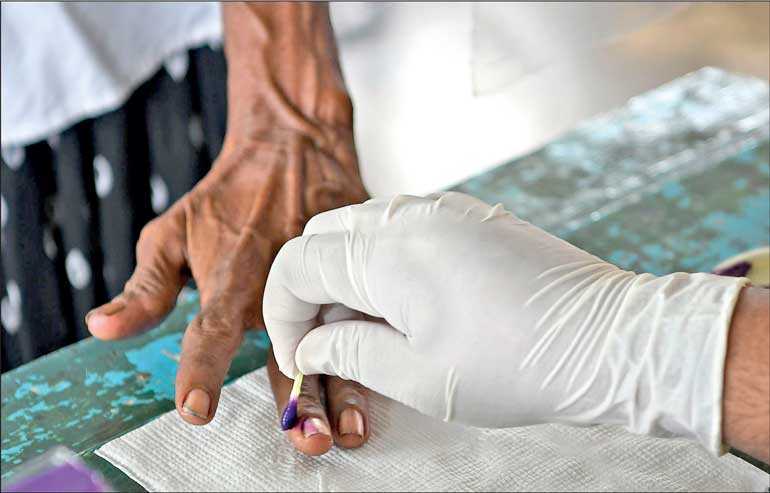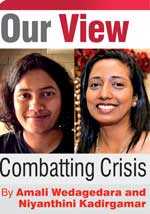Saturday Feb 14, 2026
Saturday Feb 14, 2026
Friday, 19 June 2020 00:00 - - {{hitsCtrl.values.hits}}

Globally, in the pretext of combating the COVID-19 outbreak, governments are undermining democracy. While leaders attribute their urgent decisions and actions to the virus, it would be naïve to think they  have nothing to do with their desire for greater power and
have nothing to do with their desire for greater power and
control.
Sri Lanka is not very different, except that the country is at a peculiar political juncture. The General Election originally scheduled to be held on 25 April has been postponed twice since due to the pandemic. With the legislating body no longer in operation, measures to control COVID-19 were imposed under executive orders. While the spread of the virus seems to have been contained, the arbitrary curfews, arrests and task forces consisting of current and retired military personnel and their appointments to key administrative positions raise concerns for democratic governance.
Different views are emerging about the General Election which is now fixed to be held in August. A section of the nationalist lobby wants to replace the Parliament with the Executive and the military, while others call for a boycott of the elections. Replacing politicians with technocrats is preferred by the urban middle-class who have connections to the corporate sector. Some leftists critique the call to revive Parliament as a narrow reformist agenda, suggesting forms of direct democracy as the radical alternative. Overall, an apathy has set in about elected representatives, accusing them of being corrupt and detached from people’s day to day concerns.
Though driven by a variety of factors, these positions have only fed into popular mass and social media discourses that are effectively making a case to undermine democracy.
The debates are constrained by calculative, short-sighted positions political leaders hope to market to the masses on election platforms. None bear any evidence of having drawn from any genuine dialogue with ordinary people’s realities and a long-term vision that can pave the way for transformative change.
Addressing the apathy
Disillusionment with electoral politics is attributed to the failure of elected leaders to deliver on their poll promises, unprincipled crossovers from one party to another to retain power and misuse of the parliamentary space to exercise individual privileges. The frightful attempt at a constitutional coup under former President Maithripala Sirisena in October 2018, UNP’s mishandling of governance and the blatant failure to prevent the Easter bombings further diminished the legitimacy of Parliament and credibility of its members.
In 2020, a sense of weariness for elections and parliamentary politics have taken root even as the  economic crisis weighs down heavily on a large population. Fear, caused by the April 2019 Easter terror attack and the current pandemic, further fuelled by chauvinistic narratives that speak to the deepest insecurities of ordinary men and women, only enhances the appeal of a paternalistic strong leader. As forms of democratic association in trade unions, libraries, co-operatives, public parks and civic associations are stifled, narrow racial, religious or regional identities are filling the void.
economic crisis weighs down heavily on a large population. Fear, caused by the April 2019 Easter terror attack and the current pandemic, further fuelled by chauvinistic narratives that speak to the deepest insecurities of ordinary men and women, only enhances the appeal of a paternalistic strong leader. As forms of democratic association in trade unions, libraries, co-operatives, public parks and civic associations are stifled, narrow racial, religious or regional identities are filling the void.
Misplaced overreliance on elected leaders and voting are contributing to the state of apathy. However, the lesson we learn from how democracy came about is that it is not given or granted. It is not a natural evolution, nor is it a by-product of individualism or the market. Democracy developed because masses of people organised collectively to demand it.
As much as democratic form of governance enables people to elect their representatives, participatory democracy compels the elected representatives to listen to people’s needs and aspirations to live with dignity. Thus, democracy is more than regime change and is about changing the nature of the regime itself.
Democracy sans electoral representation?
Dismissing elections as a reformist tactic has a downside to it. The elections constitute a necessary condition for democracy, paving way for a political opposition that could act as a buffer to other popular struggles, and to organise economic production and distribution on people’s terms.
As Rosa Luxemburg pointed out, “[w]ithout general elections, without unrestricted freedom of press and assembly, without a free struggle of opinion, life dies out in every public institution, becomes a mere semblance of life, in which only the bureaucracy remains as the active element.” Presently, we are faced with a different danger – of right-wing fascism, than the left-wing authoritarianism Luxemburg correctly foresaw during her time. However, her insight on general elections, as an ardent campaigner of workers’ councils herself, is still relevant today.
Elections in this regard is a pro-democratic step, and a boycott of elections cannot be condoned. Struggles in parliamentary institutions and around citizenship rights are waged in tandem with developments in social relations and culture, achieved by various forms of social mobilisation and cultural self-assertion. The failure to embrace the interconnectedness in the recent past have dearly cost our collective hopes for democracy.
The 2015 regime change was brought about by voters who felt their rights and interests didn’t have a place in the Rajapaksas’ governance. Rural people were dispossessed as urban gentrification took precedence and felt the space to air their concerns was shrinking.
Instances such as Rathupaswala, when people asked for clean water were attacked by the military in 2013, the deaths of Roshen Chanaka, a young worker in Katunayake EPZ, at a protest to safeguard working people’s hard earned EPF, and Antony, while demanding to protect their fishing livelihoods in 2011 and 2012 illustrated the height of intolerance to public dissent.
When the people felt their collective interests were threatened and needed to be saved, they used the presidential election of January 2015 to make that point, to reject rulers who didn’t care beyond their family, and rulers who would not let them mobilise for shared concerns. It was more than an anti-incumbency vote. It was a decisive vote for democratic turn, for which the promise of Yahapalanaya became a brief symbol.
Recognising the democratic space that had opened up post-elections, some groups organised to repossess lands lost during the ethnic conflict, agitate to know the truth about their disappeared loved ones, resist the exploitation of microfinance companies, abolish the private medical college-SAITM and demand higher wages for plantation workers.
However, the Yahapalanaya Government’s vision itself was geared towards adopting policies on austerity, privatisation and attracting foreign investments, ignoring the distress in the rural and plantation sectors that were among those instrumental in bringing them to power. Democratic space to agitate alone could do little in the face of mounting economic challenges.
A host of factors such as the government’s attempts to sign the MCC compact, or pass the Counter Terrorism Act, push labour law reforms and amalgamate EPF and ETF funds without the consent of the people, mismanagement of the disposal of urban waste like in the case of Aruwakkalu contributed to people’s frustrations. The government failed to listen to and act upon the concerns people expressed, any more than its predecessor Rajapaksa Government did.
Meanwhile, neoliberal policies – which both, the Rajapaksa regime and the Yahapalanaya Government embraced, have narrowed the definitions of democratic entitlements that were expanded by social welfare regimes in the earlier decades post-independence in Sri Lanka and elsewhere. Furthermore, working people, who form a significant portion of the voter base, are only experiencing humiliating treatment at the hands of the political leaders and corporate employers as the economic crisis induced by COVID-19 began to unravel. Understanding how those experiences shape perceptions of democracy is important for the current moment. An idea of democracy that embraces the lived experiences of ordinary people could render it more meaningful.
Guaranteeing access to basic services – education, health, and social security, irrespective of socio-economic capabilities or racial and gender identities can contribute towards a democracy that belongs to them. Decent jobs with living wages, equal opportunities and retirement benefits certify that they are equal partners in it. For such a democracy to emerge, the significance of public institutions cannot be undermined. Devoid of the decades of investment in free public health service, even the strongest military will not be able to tackle a health crisis like the COVID-19.
Forging a pathway for democratic futures
We must approach the upcoming elections with a cautionary note, that it may not necessarily signal a deepening of democracy. Authoritarian rulers have used majoritarian parliaments won by elections as a rubber stamp for legitimacy. The mere presence of institutions and rights do not guarantee a vibrant democracy unless people can actively participate in politics and dissent without fear.
Narrowing the conversation on democracy to the Parliament is limiting, as remarkable gains have occurred, both through popular democratic parties nationally and political movements at a transnational scale.
Feminist movements, for example, were instrumental in challenging selective and unequal access to democratic rights that prevented women from voting. The expansion of the democratic space thus is also linked to the gradual transformation of perceptions, of the public and private for example, and the inclusion of women and minority groups.
Democracy has survived by challenging unequal power in every sphere and safeguarding spaces for inclusive and equitable engagement within educational, religious and other cultural institutions.
Major democratic victories have come through revolutions and during times of great upheaval. At this crucial juncture, will Sri Lanka see the emergence of a broad movement to safeguard its democratic future?
(Amali Wedagedara is a PhD candidate at the University of Hawai’i, Manoa and Niyanthini Kadirgamar is a PhD student in Education at the University of Massachusetts, Amherst.)